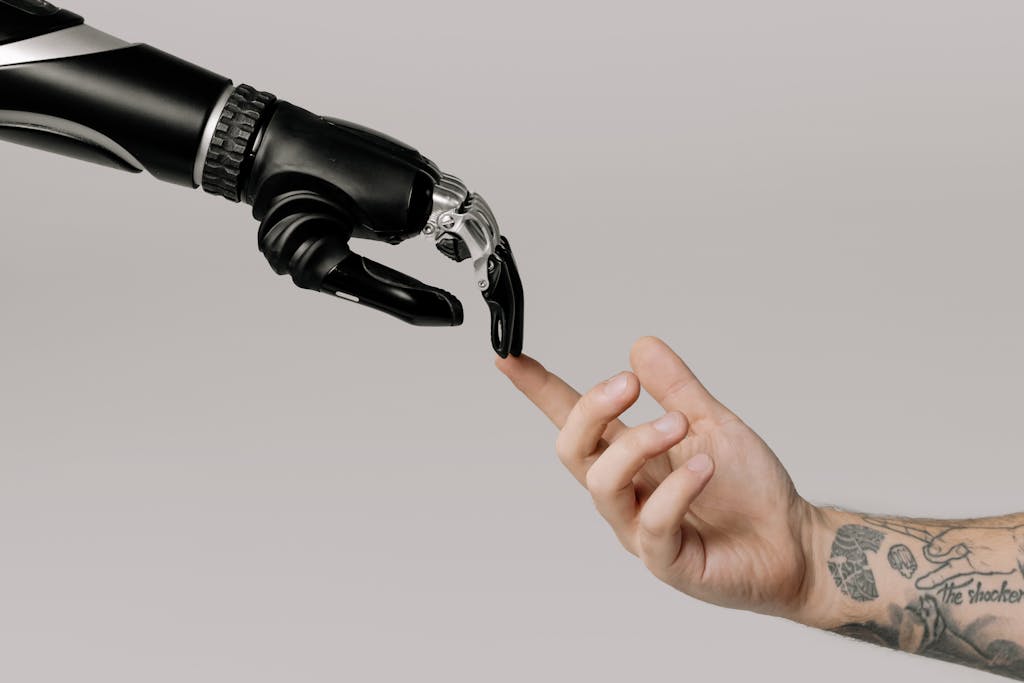If AI can now write speeches, generate quotes, and analyze behavior, do we still need motivational speakers?
A few months ago, I asked ChatGPT to “write a motivational talk.”
In less than a minute, it gave me a polished script. The words were clear. The structure was neat. It even threw in a few inspirational quotes that sounded like something you might see on a poster.
But as I read the script, I felt… nothing.
There was no weight behind the words. No pause that carried silence. No story that made me see myself in the speaker’s shoes.
It made me wonder: If AI can do this, do we still need motivational speakers?
That question is not only for speakers like me—it’s for anyone who believes in the power of human connection. Because if technology can now do what used to be a uniquely human craft, what is left for us?
This article is my answer. I’ll show you why motivational speaking not only survives but becomes more important in the AI era. Because motivation is not about perfect words—it’s about human presence, shared energy, and the stories that move us into action.
The Rise of AI and Its Promise
AI is transforming how we access and consume knowledge.
We can’t deny it: AI is changing everything.
Today, with a few keystrokes, AI can generate motivational quotes, draft entire speeches, and even analyze the emotional tone of a message. What used to take speakers hours—crafting stories, building outlines, revising drafts—AI can now do in seconds.
And it’s not just about speed. AI makes motivational content more accessible than ever. A student in Cebu can ask for “ten tips to stay motivated in school.” A manager in Manila can request “a five-minute speech on teamwork.” And instantly, AI delivers.
That’s the promise: efficiency, accessibility, and even democratization.
But here’s the tension: when words become abundant, they risk becoming cheap. When every person can generate a motivational script, the challenge is no longer access—it’s depth.
Because while AI can give us words, only humans can give us weight.
A colleague once told me he started using AI to send daily motivational messages to his team. At first, people replied with likes and thumbs-up emojis. But within a week, they stopped reacting. The words were there, but the meaning was missing.
That’s the side effect of the AI promise. It gives us content at scale, but it cannot give us the spark of connection.
If AI is making motivational content abundant, what are the unintended consequences? Let’s look at the side effects of an AI-driven world—and why they actually make motivational speaking more vital.

The Side Effects of an AI-Driven World
When machines make words abundant, meaning becomes scarce.
We live in a time where motivational content is everywhere. Quotes fill our feeds. Short videos promise to change our lives in thirty seconds. And with AI, this content explosion will only multiply.
On the surface, this looks like a good thing. More access means more inspiration, right? But there’s a hidden side effect: the more common something becomes, the less we value it.
That’s why people scroll past motivational quotes without even pausing. It’s not because they don’t care—it’s because they’ve seen a thousand similar lines before.
One executive told me, “I ask ChatGPT to give me daily motivational quotes for my team. At first, they liked it. After a few days, no one even read them.”
It’s not that the words were wrong. It’s that they lacked weight. Motivation isn’t about consuming more words—it’s about creating moments that stay with us.
That’s where motivational speaking matters. A live speaker doesn’t just give you words. They give you presence. They give you energy in the room. They give you a story that feels like it’s yours.
That’s what I focus on when I step on stage in the Philippines—not just talking, but creating shifts that last. If you’re curious how I do it, you can explore more here: Motivational Speaker Philippines.
Why Motivation Requires a Human Being
Motivation isn’t information—it’s energy, empathy, and presence.
Neuroscience tells us that human beings are wired for connection. We mirror the emotions of the people around us. That’s why laughter spreads in a room, and why one person’s energy can lift or drain an entire team.
AI can write a line like, “Don’t give up—you’re stronger than you think.” But only a human being, sharing their own struggle, can make you feel the weight of those words.
I’ve seen this in my workshops. Sometimes, it’s not the big speech that moves people—it’s the pause after a story, when the room is silent and everyone feels the same emotion at once. AI can’t create that silence. AI can’t hold that space.
In one leadership training, I told the story of my early years as a teacher, earning just ₱6000 a month and wondering if my efforts mattered. I didn’t have to add a fancy quote. The story alone made people nod, some even tear up—because they saw themselves in it.
That’s the difference. AI gives you information. A motivational speaker gives you a mirror, a spark, and a story that you carry long after the talk ends.
And that’s why, even in the AI era, motivational speaking isn’t just relevant—it’s necessary.
If motivation requires a human being, then what exactly do motivational speakers bring that AI can’t? Let’s talk about the shifts that only speakers can create.
The Shift That Speakers Create
Motivational speaking is not about hype—it’s about designing shifts.
For a long time, motivational speakers had a bad reputation. Some were known for shouting on stage, walking on coals, or making people clap and chant without any lasting change.
But here’s the truth: real motivational speaking is not about hype. It’s about helping people see themselves differently and act differently afterward. It’s not about the noise—it’s about the shift.
From Hype to Shift
When I step into a room, I don’t just ask, “How can I inspire them for today?” I ask, “What shift can they carry for tomorrow?”
- From feeling powerless to seeing possibility.
- From seeing themselves as “just employees” to “leaders who own results.”
- From thinking “I can’t do this” to “I’m becoming the kind of person who finishes.”
These shifts don’t happen because of perfect words. They happen because of stories, energy, and connection that land in people’s hearts.
Three Shifts Speakers Bring
- Mirror – People see themselves in the story.
- Example: The student who thought he was “lazy” until he became a “finisher.”
- Spark – The emotional energy to act now.
- Example: Call center agents who felt drained until they saw the impact of their small wins.
- Story – A bigger narrative they want to join.
- Example: Communities rallying around bayanihan after a disaster.
That’s what makes live speaking irreplaceable. We don’t just speak—we design shifts.

Why Motivational Speaking Matters in the AI Era
The more advanced technology becomes, the more people crave human presence.
This is the paradox: the more powerful AI gets, the more valuable human speakers become.
Reason 1: AI Creates Data; Speakers Create Meaning
AI can tell you about resilience. But when a speaker shares how they failed and got back up, the lesson carries weight.
- Example: AI could write my ₱6000 teaching story, but only I can live it with the emotion and risk it carried.
Reason 2: AI Delivers Content; Speakers Deliver Connection
AI can recommend articles or generate scripts, but it can’t look an audience in the eye. It can’t laugh with them, pause with them, or feel their energy shift in real time.
- Example: In one corporate workshop, the moment of breakthrough came not from a slide, but from a shared laugh that dissolved tension in the room.
Reason 3: AI Speaks to the Head; Speakers Speak to the Heart
AI appeals to logic. But human speakers move identity and desire.
- Example: Carlo, the student who became a “finisher,” didn’t change because of new information—he changed because a story reshaped his identity.
That’s why motivational speaking matters now more than ever. AI can give you content on demand. But only a human being can give you an experience that stays.
If your team or organization needs more than quotes and quick scripts—if they need real shifts—this is where motivational speaking makes the difference. I talk more about that here: Motivational Speaker Philippines.
Still, some people ask: if AI keeps getting better, won’t it eventually replace speakers too? Let’s address the biggest questions people raise about motivational speaking in the AI era.
AI vs. Motivational Speakers: What’s the Difference?
AI can give you words. Speakers give you shifts.
| AI-Generated Content | Motivational Speaking |
|---|---|
| Delivers information fast | Creates transformation that lasts |
| Polished but predictable | Messy, real, and memorable |
| Speaks to the head | Speaks to the heart and identity |
| Accessible anytime, anywhere | Unique, unrepeatable in-the-moment experience |
| Scales efficiency | Scales emotion and connection |
| Provides quotes and scripts | Designs shifts and shared stories |
| Mimics empathy | Lives empathy through presence |
| Can say “don’t give up” | Can show scars, laughter, and lived resilience |
With the differences clear, let’s dive into the biggest questions people ask about motivational speaking in the AI era—and why the answers all point back to one truth: humans still move humans.
FAQ: Common Questions About Motivational Speaking in the AI Era
The questions people ask most often—answered with stories and shifts.
Q1. Isn’t AI more efficient than a human speaker?
Yes, AI is faster. It can generate a speech in seconds, while a speaker may take hours or days to prepare. But efficiency is not the same as transformation.
Think about fitness. You can download a perfect exercise plan from the internet in seconds. But does that plan make you get up at 5:00 AM to run? Not really. What pushes you is the coach who looks you in the eye, runs beside you, and tells you “You’ve got more in you.”
I once delivered a keynote to a group of government employees who had heard all the “productivity tips” before. What moved them wasn’t a list of hacks—it was when I told my own story of burnout and asked, “What’s the one shift you can make today?” That moment led to visible tears, nods, and conversations long after the session ended. AI could give them tips. But only a speaker could give them a spark.
Q2. Can’t AI be programmed to be more emotional?
AI can simulate emotion—it can use words like “I understand” or “I feel your struggle.” But it cannot live emotion.
Emotion is not only in the words—it’s in the trembling of a voice, the weight of a pause, the way an audience’s laughter shifts the rhythm of a story. Those moments can’t be pre-programmed.
In one workshop, I shared my ₱6000 teacher story—the struggle, the questions, the doubt. I didn’t add dramatic flair. I just told it honestly. The room went silent. Some participants later told me, “That’s my story too.” AI could have written the script, but it couldn’t have carried the silence, the vulnerability, or the weight of lived experience.
Q3. Why pay for a speaker if AI content is free?
This is like asking, “Why watch a concert if you can stream music at home for free?”
People don’t pay for access to words. They pay for experiences. For the energy in the room. For the shared laughter and the collective shift.
A company once told me, “We’ve shown motivational videos to our team, but they don’t seem to care.” When I spoke live, something different happened. People stood, laughed, debated, and reflected together. Weeks later, the HR manager emailed: “They’re still talking about your story in meetings.”
That’s the value. A motivational speaker doesn’t just give you lines. They create an experience you carry into action.
Q4. Will AI eventually replace speakers completely?
AI will replace shallow, hype-driven motivational speaking—the kind that’s only about quotes and clichés. But real motivational speakers, the ones who design shifts, will thrive.
In fact, AI will make the best speakers even better. It can handle research, structure, and data, while speakers focus on what machines cannot: presence, empathy, and transformation.
When I prepare for a talk today, I sometimes use AI to brainstorm or refine an outline. But when I step on stage, AI steps aside. What matters in that moment isn’t the outline—it’s the eye contact, the silence, the laughter, the story told with scars still visible.
So no—AI won’t replace speakers. It will expose which speakers were only delivering hype and which ones were truly creating shifts.
Now that we’ve answered these questions, the picture is clearer. AI will change the landscape, yes. But in the end, motivational speaking matters even more—because people don’t just need words. They need human sparks, shared stories, and shifts that last.
The Future: Speakers Who Work With AI, Not Against It
AI is a tool, not a threat, for those who design shifts.
It’s easy to look at AI and feel threatened. If a machine can write a speech faster than I can, am I still relevant?
Here’s the truth: AI is not the enemy of motivational speaking. It’s the assistant. The real danger is not AI—it’s speakers who refuse to evolve.
How AI Supports Speakers
AI can make us better if we use it wisely.
- Research: AI can summarize books, articles, and case studies in minutes, giving speakers more time to focus on stories and presence.
- Structure: AI can suggest outlines, ensuring ideas flow clearly.
- Customization: AI can help tailor content for specific audiences, providing insights into their challenges and goals.
Before a corporate keynote, I once used AI to analyze survey responses from employees. It flagged recurring frustrations. That saved me hours of manual review and allowed me to design stories that hit closer to home. AI gave me the patterns. I gave them the human spark.
The Human-AI Partnership
The future belongs to speakers who combine AI’s efficiency with human presence.
Think of it this way:
- AI for Content – to generate ideas, refine words, analyze data.
- Humans for Connection – to bring empathy, energy, and lived stories into the room.
This partnership doesn’t diminish motivational speaking. It multiplies it.
Story: Imagine attending a session where AI analyzes team mood in real time, but the speaker responds on the spot with humor, stories, and exercises that re-energize the group. The machine gives the feedback; the human delivers the transformation.
That’s the future: not speakers replaced, but speakers amplified.
Why This Matters Now
AI will raise the standard. People will no longer tolerate cookie-cutter, hype-driven motivational talks—they can get that from a chatbot for free. What they will pay for is authenticity, vulnerability, and transformation.
Motivational speakers who see themselves as shift designers will thrive in the AI era. Because the essence of speaking is not “delivering content”—it’s creating experiences that AI cannot replicate.
And that brings us back to the heart of this question. In a world overflowing with AI-generated words, why do motivational speakers still matter? Because machines can’t hold silence, can’t carry scars, and can’t spark the kind of human fire that moves people into action. Let’s close with the unreplaceable spark.
The Unreplaceable Spark
AI may flood the world with words. But only humans can turn words into fire.
When I first asked AI to write a motivational talk, I was impressed. The sentences were clean. The quotes were polished. It looked like something you could deliver at a conference.
But as I read through it, I felt nothing. No pause that made me hold my breath. No laugh that released the tension. No story that made me whisper, “That’s me.”
That’s when it became clear: AI can give us content, but it cannot give us connection. It can mimic inspiration, but it cannot move identity. It can generate speeches, but it cannot carry scars, vulnerability, or presence.
I’ve seen this difference in every live talk I’ve given. In the silence after a personal story. In the tears that fall when someone realizes they’ve been seen. In the burst of laughter that transforms strangers into teammates.
Those moments don’t happen because of perfect words. They happen because of the energy we share when human beings come together.
So yes, AI is here to stay. It will change the way we prepare, the way we learn, the way we access information. But it will never replace the unreplaceable spark of human connection.
That’s why motivational speaking still matters in the AI era. Because at the end of the day, humans don’t just need information—they need stories that shift, mirrors that reveal, and sparks that ignite.
And those can only come from another human being.
Your Move Today
If you’ve ever thought, “I can get all the motivation I need from AI-generated quotes,” remember this: content informs, but presence transforms.
Whether you’re leading a team, teaching a class, or raising a family, don’t just send words. Show up. Share stories. Hold space. Create shifts.
Because motivation isn’t about reading more lines—it’s about living moments that move you.
And if your organization is ready for more than AI-generated inspiration, you can explore what real motivational speaking looks like here: Motivational Speaker Philippines.
